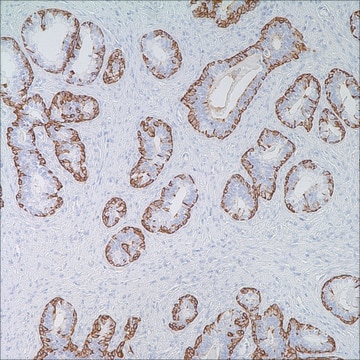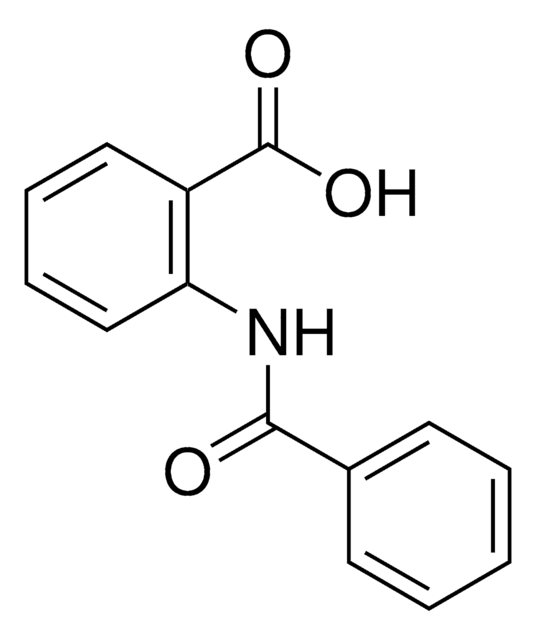推薦產品
生物源
mouse
品質等級
100
500
共軛
unconjugated
抗體表格
culture supernatant
抗體產品種類
primary antibodies
無性繁殖
KBA.62, monoclonal
描述
For In Vitro Diagnostic Use in Select Regions (See Chart)
形狀
buffered aqueous solution
物種活性
human
包裝
vial of 0.1 mL concentrate (366M-94)
vial of 0.5 mL concentrate (366M-95)
bottle of 1.0 mL predilute (366M-97)
vial of 1.0 mL concentrate (366M-96)
bottle of 7.0 mL predilute (366M-98)
製造商/商標名
Cell Marque®
技術
immunohistochemistry (formalin-fixed, paraffin-embedded sections): 1:25-1:100
同型
IgG1
控制
melanoma
運輸包裝
wet ice
儲存溫度
2-8°C
視覺化
membranous
一般說明
Anti-KBA.62 (Melanoma Associated Antigen) is a novel anti-melanoma antibody. Studies thus far have shown a similar sensitivity to melanocytic proliferations as that seen with S-100 protein staining, which is somewhat higher than that seen with anti-HMB-45. This has been confirmed by one study on a series of 215 sentinel lymph nodes. Moreover, anti-KBA.62 identified 6 patients (3%) who had confirmed sentinel lymph node metastasis but stained negative using anti-HMB-45. In this setting, the resolution appears to be higher than S-100 protein in that the staining pattern (membranous) is quite distinct. Interestingly, most cases of desmoplastic and spindle cell melanomas show strongly positive results with anti-KBA.62, unlike that seen with other melanocyte markers. It should be noted that anti-KBA.62 will label occasional endothelial cells which can serve as an internal positive control. A small percentage of well-differentiated squamous cell carcinomas of the skin (and lung) have also been noted to stain with this antibody; however, the poorly-differentiated forms of carcinoma do not, thus resolving a greater practical problem in differential diagnosis. Anti-KBA.62 is a useful additional marker for melanoma, specifically in desmoplastic/spindle cell cases and in the context of micrometastasis in sentinel lymph node.
聯結
KBA.62 Positive Control Slides, Product No. 366S, are available for immunohistochemistry (formalin-fixed, paraffin-embedded sections).
外觀
Solution in Tris Buffer, pH 7.3-7.7, with 1% BSA and <0.1% Sodium Azide
準備報告
Download the IFU specific to your product lot and formatNote: This requires a keycode which can be found on your packaging or product label.
其他說明
For Technical Service please contact: 800-665-7284 or email: [email protected]
法律資訊
Cell Marque is a registered trademark of Merck KGaA, Darmstadt, Germany
未找到適合的產品?
試用我們的產品選擇工具.
從最近期的版本中選擇一個:
分析證明 (COA)
Lot/Batch Number
P Kocan et al.
Ceskoslovenska patologie, 40(2), 50-56 (2004-07-06)
In certain primary and metastatic malignant melanomas diagnostic problems may arise due to their cytologic features and/or absence of synthesis of melanin. As the "classic" combination of S-100 protein and HMB-45 may occasionally fail to stain cells of malignant melanoma
E Cohen-Knafo et al.
Journal of clinical pathology, 48(9), 826-831 (1995-09-01)
AIMS--To generate new monoclonal antibodies directed against melanoma associated antigens using a new melanoma cell line, KAL. METHODS--The melanoma cell line was established in culture from a lymph node metastasis of malignant melanoma. Normal Balb/c mice were immunised with KAL
Cécile Pagès et al.
Human pathology, 39(8), 1136-1142 (2008-05-23)
We previously described a novel antimelanoma antibody, designated KBA.62. However, review of the literature showed that only a few studies have reported on this antibody. We report our experience in the diagnosis of melanoma using KBA.62 and its value in
O Kaufmann et al.
Modern pathology : an official journal of the United States and Canadian Academy of Pathology, Inc, 11(8), 740-746 (1998-08-28)
The authors retrospectively tested the potential value of paraffin-reactive monoclonal antibodies (A103 against melan-A, T311 against tyrosinase) and antibody KBA62 as immunohistochemical markers for amelanotic metastatic melanomas. The study cases included 72 amelanotic metastases of known cutaneous melanomas, 59 poorly
文章
IHC antibodies enhance dermatopathology beyond H&E stained slides, improving techniques and applications for dermatological research.
我們的科學家團隊在所有研究領域都有豐富的經驗,包括生命科學、材料科學、化學合成、色譜、分析等.
聯絡技術服務








